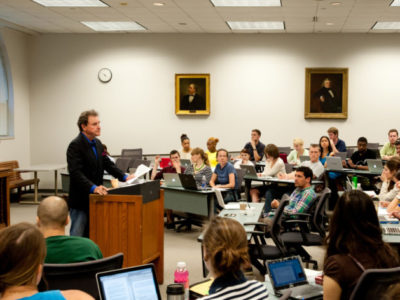Ever find yourself thinking, “If Elle Woods did it, so can I?” Sorority president, 179 LSAT score and impeccable fashion—she makes for quite a tough act to follow. I have good news for you. Even though we can’t all be as fantastic as Elle Woods, we can still find a place in law school. All in all, law school can be a scary process. Even if you came into college stuck to the rails of the pre-law track, the idea of law school, the LSAT and cold-calls probably frighten you a bit. Personally, I know I get nervous thinking too much about it. And before the climb to the summit of Mount Attorney can begin, we have to actually get accepted to a law school first. Luckily, this first hurdle seems much more accomplishable after hearing these anecdotes and pieces of advice from current law students, lawyers and an admissions dean.
Read on to follow the general path of a law school applicant and the various questions that may arise during this time.

I’d like to thank law school experts: Dean Robert Schwartz from UCLA Law, civil rights attorney Michael Chang Ph.D., from UCLA Law, practicing attorney Joshua Wade from Loyola Law School, 1L Kenneth Park from Loyola Law School and 1L Kristie Sham from Harvard Law for providing such invaluable insights about the law school admissions process.
So You Want to Go to Law School? Why?

After you decide you want to be a lawyer and will attend law school, you need to ask yourself the most iconic and possibly dreaded question: “why?” And just a word of advice, I don’t think the answer, “law seems cool” counts. Law school requires a huge commitment. Part of the process relies on gaining a clearer understanding about why you want to go. Some graduates may have the luxury of joining the work force and deciding that they want to try something else. But finishing law school and realizing you want to do something else makes for one expensive mistake—I’m talking $145,000 at least. If you think you have your golden reason, then great. But just in case, read on below to uncover some bad and better reasons for wanting to become a lawyer.
Bad Reasons (Ever Heard of More Money More Problems?)

We’ll begin with the cursed grail of reasons that should not make up your “why-I-want-to-go-to-law-school” list. One particularly crummy reason that stands out among the rest: making lots of money. “Going for money is a particularly bad reason. You will definitely burn out,” Loyola Law School 1L Kenny Park said. You do not want to experience burn-out during law school. No matter how badly you want the big bucks, law school or lawyering will break you down if you commit to it for the wrong reason. “While it is possible to make a lot of money in certain types of law, doing anything primarily for money often does not result in satisfaction,” civil rights attorney Michael Chang said. Newsflash: when it comes to choosing a life-long career, you have to genuinely care about something more than the money.
“I strongly advise against becoming a lawyer to make lots of money—just get an MBA instead,” Loyola Law School graduate Joshua Wade said. Speaking to this point, you can complete an MBA faster and cheaper, while probably earning more money afterwards. Must be nice.
On a different note, going to law school because you don’t know what you want to do, also lands on this “bad reasons” list. If you don’t know what you want, I recommend taking a gap year to go work and think about law school in the meantime. “Not taking a gap year produces relatively zero benefits and there is no real advantage to rushing through it,” Wade said. Working for a year while you prepare to apply simultaneously helps you get experience and creates an opportunity for a robust personal statement.
The Better Reasons

The overwhelmingly good reason for wanting to go to law school lies in this fact: you actually want to be a lawyer. Simple and deceptive, certainty that you want this becomes especially important as the price tag associated with law school is no joke. Aside from the price tag, actually wanting to be a lawyer stems from somewhere—a deeper reason as to why. If you struggle to find this reason, don’t be afraid to take a year to think about it.
“You should consider taking a gap year to work in a field that can inform your choice of legal field,” Chang said. These insights can potentially lead you to this deeper reason and give you a plan. Whether because you want to help people, you want an intellectually challenging job or plenty of other reasons—your reason will help you grind through law school and write a well-directed and purposeful personal statement.
Now that you made sure you have a good reason for wanting to go to law school, congrats! Now, you need to take the steps of actually applying.
A Quick Rundown on the Application

“I don’t need backups. I’m going to Harvard,” Elle Woods in Legally Blonde.
Remember the “Oh, it’s October and college apps are due November 30th” panic? If not, I commend you. The law school application process will be much longer and requires adequate planning. The process consists of four main parts: the LSAT, GPA, letters of recommendation and a personal statement (also supplemental essays depending on the school). Ever take a class where your final grade is a midterm and a final? Law school applications have a bit more breathing room, but not by much!
Sauce Up Your Personal Statement

After Elle Woods said, “give it a little something extra”, she ended up turning in a pink resumé. I would recommend against that but considering she got into Harvard—perhaps, she knows a thing or two that I don’t? On a serious note, the personal statement often aligns with your reason for wanting to become a lawyer or go to law school.
“The personal statement is an opportunity for the admissions committee to get to know more about you… read each law school’s question carefully,” UCLA Law Admissions Dean Robert Schwartz said. “Think about what you might want to say to the admissions committee if you had the opportunity to interview with them and include that content in your statement. Keep the focus on you.”
While the admissions will have your LSAT score, GPA and letters of recommendation to try and get to know you, the personal statement can really help your cause along. With already limited application space, the personal statement doesn’t have room for you to discuss someone else’s life story.
Remember when we learned we should have a good reason for wanting to go to law school? The personal statement finally presents you with the chance to show the application readers that you have a clear vision for yourself. Also, that know why you want to go into law and that you have the conviction to push through when law school gets tough.
“You should show them that you have a ‘how’ you are going to accomplish your plan. Really sell that vision to the admissions office,” Wade said.
You need to show you have a coherent vision of why you want to be a lawyer. Sure, plans may change and things may go differently, but presenting a strong case for your law school admittance is a must. “My advice to any applicant is to solidify the reason you want to go, it will drive you,” Park said. The more you develop this reason, the more developed your personal statement will be and further, the greater chance you have at successfully getting in.
A Dean’s Recommendations about Recommendations

Not to be overlooked, the letters of recommendation can have the potential to really tie your application altogether. “I think you should devote the most energy to securing the best letters of recommendation you can get,” Schwartz said. Most schools will want a mixture of academic and professional recommendations. Knowing all this, plan accordingly—set yourself up so people know your strengths and will want to write you a recommendation. “I always recommend connecting with professors. Being more engaged in your courses will go a long way, both for your own interest and for eventually requesting letters of recommendation,” Harvard Law 1L Kristie Sham said. Building those relationships with professors will turn out to be very important—no matter how scary it can seem.
“Try to have a letter of recommendation from an actual lawyer,” Wade said. Not only do you need letters of recommendation but if you shadow or intern for an actual lawyer, that can give you insights into the field and what you may want to do. Most importantly, make sure your recommenders know your strengths well. With someone vouching for you, the admissions office gets some reinforcement from these recommendations helping your personal statement out. Don’t leave your letters of recommendation until the end and make sure to plan ahead!
GPA—Is it the Great Restrictor?

Can a low GPA crush your chances at your dream law school? Unfortunately, yes. As it goes with most grad school programs, an astoundingly high GPA will grant you a more realistic chance at top-ranked law school. When looking up law schools, you can typically find a chart that will give you the law school, its rank, the median LSAT score and the median GPA. Many believe that the LSAT and the GPA make up the two most important factors. Debatable of course, but both take a very heavy stake in the entire process for sure. As a freshman or someone getting ready to apply—be mindful of your GPA and this will help you understand where you have the best chances of getting in.
Goodbye Saturdays, Hello LSAT(urdays)

If you didn’t consider my attempt at a pun funny, then we’ll agree the LSAT really is no joke and you’ll be studying excessively for the foreseeable future. If you already started studying, then you’ll realize I’m writing in conditional statements. Note: conditionals will become your best friend on the test. You should begin studying for the LSAT at least 3-6 months before taking it—possibly even a year—maybe even become a logician. You should also take the LSAT before you begin working on your applications so that you have a general idea about what scores you have for which schools.
Both Kenny Park and Joshua Wade, who each went to law school straight out of UC Berkeley and UCLA, recommend putting the most amount of energy into studying for the LSAT. “I think the LSAT score is weighted the heaviest, sadly,” Park said. In two rigorous and face-paced schools, studying for the LSAT while enrolled in college proposes an enormous challenge. “In order to properly study, you need to actually block out the time—and make sacrifices; really dedicate yourself to it.”
While studying and committing to it proposes some hardships, a test prep company offers a great way to help you stay on track. “If you’re thinking of a course, most test prep companies will allow you to sit in on a class and try it out! I would also recommend researching possible student discounts,” Sham said. Test prep might break the bank, but you might also find a great deal. The LSAT makes up a massive piece of the admissions puzzle so, be sure to give yourself ample time to prepare and invest in yourself.
Final Advice

Now for some final pieces of advice and a big thank you to the following who contributed their expertise to this article:
“Make sure [your personal statement] is grammatically correct. The committee also uses the statement to gauge your writing ability (along with the writing sample from the LSAT). Much of lawyering relies on attention to detail—so start early!” said Dean Robert Schwartz, UCLA Law.
“Take some time to review the programs and centers at each school. Not all law school experiences are the same,” said Michael Chang Ph.D., UCLA Law.
“Take advantage of mentors who will answer your questions and connect you to helpful people. If you dedicate the time and meet and engage with people, it will help you navigate your legal career. Of course, extend this help to others as well,” said Kristie Sham, Harvard Law.
“Really solidify the reason you want to go to law school, it will drive you through the application process and the hardships of law school. And also, do your best on the LSAT! Know yourself and if you really want to go to law school—you have to give it your all,” said Kenny Park, Loyola Law.
“If you don’t get into the school you want the first time; then, take some time off and work, improve yourself and apply again. It’s a time to improve yourself, and don’t give up on your dreams so easily—you’re young and have time, so if you truly want it, try again,” said Joshua Wade, Loyola Law.
I hope you found some of these insights helpful and inspiring as I did. Remember to plan, reach out, have a vision and fully devote yourself to the process of becoming a lawyer. Best of luck in your legal endeavors!




















